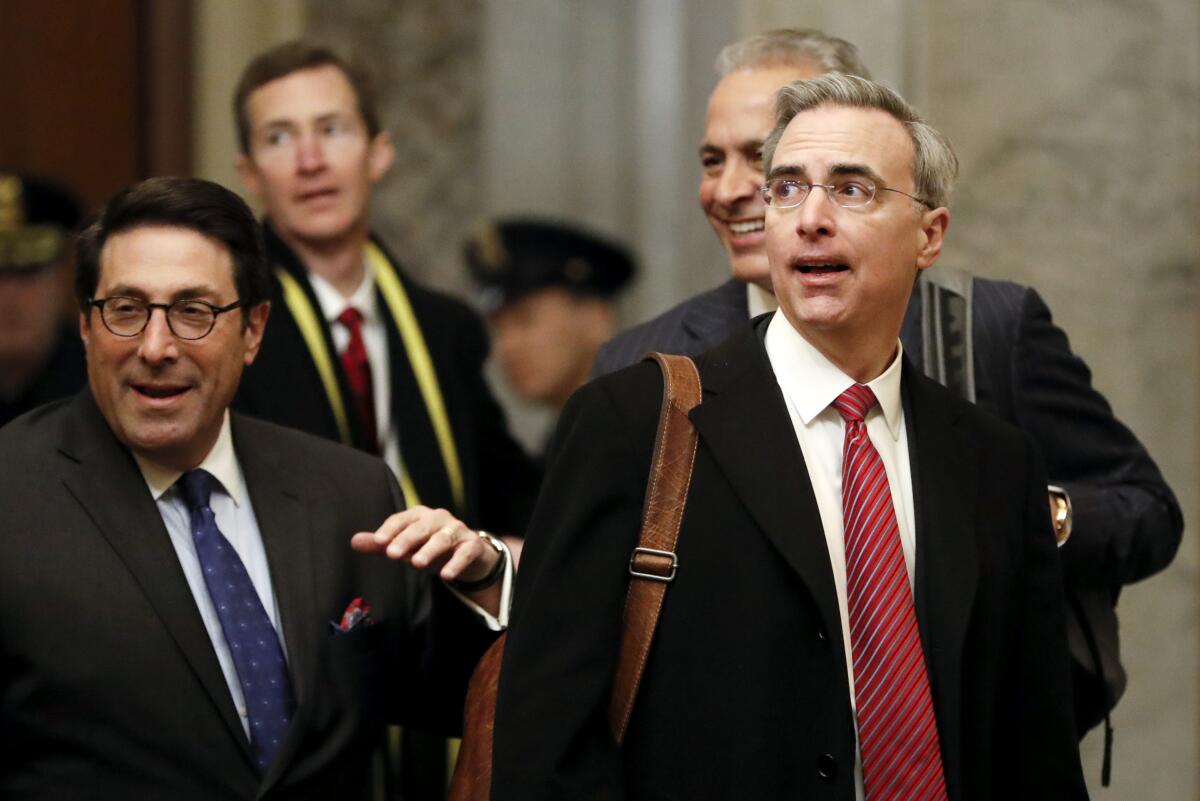Trump’s attorneys hint they will invoke executive privilege to block Bolton testimony

- Share via
WASHINGTON — President Trump’s lawyers laid the groundwork Monday for invoking executive privilege in an effort to block potentially damaging public testimony from witnesses like former national security advisor John Bolton.
Though this claim is unlikely to succeed in the courts, it could give Senate Republicans a talking point for standing firm against Democrats’ demands for witnesses to be called in the Senate impeachment trial of the president.
Executive privilege is not mentioned in the Constitution, but it has long been a favorite doctrine for White House lawyers of both parties.
It is best known in American history as the last line of defense for President Nixon when he faced impeachment for the election-year break-in at the Watergate offices of the Democratic National Committee. As the cover-up unraveled in 1974, Nixon fought to keep secret his Oval Office tapes that recorded him approving hush money for the burglars.
Nixon sued to block the subpoenas and lost unanimously in the Supreme Court. But at the same, the court recognized the validity of executive privilege, albeit with limits.
In U.S. vs. Nixon, the justices said there is a “general privilege of confidentiality of presidential communications” that has “constitutional underpinnings.” It was the first time the court had squarely recognized executive privilege. It is “fundamental to the operation of government and inextricably rooted in the separation of powers under the Constitution,” the justices said.
However, it is not “an absolute, unqualified presidential privilege of immunity,” they added. And most importantly, the president’s “generalized assertion of privilege must yield to the demonstrated, special need for evidence in a pending criminal trial.” Nixon was told he must turn over the tapes. He did so, and within two weeks, he had resigned.
For decades afterward, White House lawyers have cited executive privilege when trying to ward off repeated demands for documents from Congress. However, presidents were often wary of invoking “executive privilege” by name out of concern it might be seen by voters as attempting to cover up improper or illegal acts.
Trump has also tried to find other words to invoke the need for confidentiality. Asked last week in Davos, Switzerland, about whether he would try to prevent testimony from Bolton, Trump said, “But when you have a national security — where you could call it a presidential prerogative. The way I look at it, I call it national security. Executive privilege, they say. So John would certainly fit into that. When you’re a national security advisor ... I just think it’s very hard.”
The president’s lawyers have been more direct in asserting executive privilege in the Senate trial. Jay Sekulow, the president’s personal attorney, bristled at House manager Rep. Jerrold Nadler (D-N.Y.) for appearing to question the use of executive privilege in this case.
It rests on “decades of precedent” upholding the principle that the presidents “need candid advice from their top aides,” he said. “Going to court is not an abuse of power,” he added.
Deputy White House Counsel Patrick Philbin devoted his presentation to a lengthy defense of executive privilege. The Supreme Court, he said, has recognized that the “confidentiality of communications ... is fundamental to the operation of government.... This is a standard principle asserted by the administration of both parties. It is not a partisan issue,” he said. When the president invokes executive privilege, he said, there is a “constitutionally mandated accommodations process.... The goal is to reach a compromise.”
But it remains unclear whether the president will invoke executive privilege and, if so, how.
The president’s team could argue that protecting national security gives GOP senators a basis for refusing to call Bolton.
Sekulow also hinted at the possibility of going to court to assert executive privilege. Most legal experts have downplayed this option because the Constitution clearly says “the Senate shall have the sole power to try all impeachments.” And the Senate’s rules for impeachment say: “The Senate shall have power to compel the attendance of witnesses.” It would be unusual for a federal district judge to step into the middle and assert the power to decide whether the Senate may call a witness.
The Nixon court case arose because an independent counsel he had appointed had issued a subpoena demanding the tapes in relation to another criminal investigation. The courts had little choice but to decide the dispute.
The House managers have said that Chief Justice John G. Roberts Jr. should be asked to decide. But while the Senate rules say the chief justice “may rule on all questions of evidence,” they also make clear a majority of senators can decide for themselves, including by overruling the chief justice.
Philbin’s comments about “compromise” and “accommodations” suggest the White House may favor a middle option in which, for example, Bolton could testify but only behind closed doors before the Senate. This could be justified as a means to protect national security and confidentiality while allowing the senators to hear Bolton answer questions under oath.
Later this week, the Senate is expected to turn to the question and a vote on whether to call witnesses.
More to Read
Get the L.A. Times Politics newsletter
Deeply reported insights into legislation, politics and policy from Sacramento, Washington and beyond. In your inbox twice per week.
You may occasionally receive promotional content from the Los Angeles Times.











